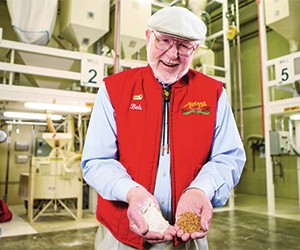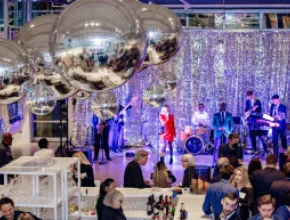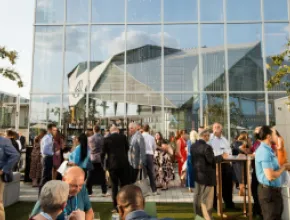Want to hold a green meeting in Oregon? A bigger challenge is not to. Whether they are relaxing with a frosty pint at a neighborhood brew pub or grabbing a cup of coffee between sessions at the Oregon Convention Center, meeting attendees in Oregon experience sustainability in action at every turn.
“Being green and sustainable is just second nature to us—sometimes we don’t even think of what we offer,” says Janis Ross, vice president of convention and sports marketing for Travel Lane County. “Our communities are committed to sustainability.”
While not all meeting planners are drawn to Oregon because of its leadership role as an environmentally friendly destination, many are, says Amy Spatrisano, principal at the Portland-based meeting planning company MeetGreen.
“The culture here in the Pacific Northwest helps support sustainability, which is something people expect when they come here,” she says. “The fact that we have a reputation for green practices works to our advantage.”
Portland
While Portland may not be Oregon’s governmental capital, it is definitely its capital of sustainability. While green-friendly venues and practices can be found throughout the state, by far the greatest concentration of them is in Portland, Spatrisano says.
“If you are based in metro Portland, you are more likely to find the same cultural expectations of sustainability,” she says. “In more rural areas or the further east you go, it tends to be less so.”
When it comes to working with planners, Portland’s green attributes are always part of the discussion, says Desiree Everett, conventions sales manager for Travel Portland.
“I sometimes have to forewarn people that they are going to hear about green practices from every hotel. This is something people here are very proud of,” she says. “For planners who are looking for a sustainable conference, their decision is often influenced by the fact that Portland is a leader in this.”
When looking for sustainable venues, there may be no better examples than Portland’s two major meetings facilities: the Oregon Convention Center and the nearby Doubletree by Hilton Portland. While Portland boasts 17 hotels that received LEED certification or other green designations, Spatrisano singles out the Doubletree for its consistent approach to sustainability, despite the fact that it is an older property that did not have the advantage of being designed according to LEED specifications from the U.S. Green Buildings Council. PageBreak
“Sustainability is built into the culture of the hotel, and they have built a unique environment,” she says. “The chef not only works with local farms, but has a partnership with local Native Americans to use the salmon they catch. No matter who you talk to at the Doubletree—say, the concierge—they all take pride in what the hotel is doing.”
The Oregon Convention Center, one of the first convention facilities in the nation to earn LEED certification, continues to fine-tune its green practices. The center is currently working on initiatives to raise its Silver LEED rating to the Gold level in 2013. Already working with a purveyor, Pacificwild Catering, to ensure that banquet fare is sustainable and locally sourced, the center recently replaced its Starbucks outlet with a vendor serving organic and locally roasted coffee.
Other signs of sustainability can be found in the wealth of hotels and venues in and around Portland that were converted from historic buildings that once served other purposes. Among the city’s newer repurposed meetings hotels is The Nines, a downtown property that was converted from the former Meier & Frank department store and received Silver LEED certification in 2009.
A wealth of imaginative, repurposed off-site venues in and around the city are operated by Portland-based McMenamins, Spatrisano says. Among her favorites are the Kennedy School, a 100-year-old former school that is now a small hotel, restaurant, microbrewery and event space, and Edgefield, which was built in 1911 as a county poor farm and is now a 74-acre complex that includes restaurants, a spa, a theater, gardens and a wide choice of indoor and outdoor event space.
“The buildings at Edgefield were left to disintegrate, but now it’s a really fun place to go with a lot of different options for groups,” she says.
Another restored historic building that draws green-focused events is the Ecotrust Building in the Pearl District, which includes a rooftop terrace and the Billy J. Frank Conference Center. Operated by the Ecotrust conservation group, the building was the first historic renovated structure in any city to receive LEED Gold certification.
“Travel Portland recently did a great team event at the Ecotrust Building using a local farmers market that takes place in the parking lot on Thursdays,” says Spatrisano, who took part in the event. “Each team had a list of ingredients to get at the market for the chefs to make for our meals.”
With its close access to fresh and organic ingredients, sustainable food and beverage options abound in Portland. Several local chefs maintain their own farms, offering options for groups to tour farms and enjoy a lunch or dinner prepared from its ingredients, Everett says.
“Food and beverage really shine here—as we have such great bounty in Oregon,” she says. “Most of our chef’s have a farm-to-table philosophy.”
At the forefront of Portland’s farm-to-table approach is Meriwether’s Restaurant, where many dishes are prepared with produce from the restaurant’s Meriwether’s Skyline Farm 20 minutes from downtown. Located in a historic building that was once part of the 1905 World’s Fair, the restaurant offers indoor and outdoor event space for groups of up to 300. PageBreak
Willamette Valley
Another area known for its green initiatives is Lane County, which stretches from the Cascade foothills to the central Oregon coast. In particular, the city of Eugene offers plenty of venues with a sustainable focus, according to Travel Lane County’s Janis Ross.
“Eugene has won awards for being one of the country’s most walkable cities and as a green business city,” she says. “We also have a great transit system that works with groups to provide free or discounted passes.”
Among green-friendly venues noted by Ross is the Hilton Eugene & Conference Center, a downtown property near the University of Oregon campus that follows a long list of green initiatives, including thermostat sensors that automatically adjusts the temperature as guests enter and leave their rooms. Another is the Center for Meeting and Learning at Lane College, where on-site catering uses fresh produce from an on-campus garden maintained by culinary students.
Farther up the Willamette Valley, the Allison Inn is one of fewer than 25 hotels in the nation to receive LEED Gold certification. Initiatives at the luxury property include an expansive chef’s garden, glassware made from recycled wine bottles, spa products using grape seeds from local wineries and a green sedum roof on the conference wing that slows and filters rainwater run-off. The most desirable parking spaces are reserved for guests driving hybrid or electric vehicles.
“We do a lot of small things for green meetings, such as providing loose paper rather than notepads, so there is no waste,” says Pierre Zreik, the property’s general manager. “Planners and attendees really appreciate this kind of attention to detail.”
Central Oregon
Meeting planners will find no shortage of green meeting options in Bend, a city on the sunny eastern side of the Cascade mountains, where outdoor recreation abounds.
“Bend is very up on green initiatives—whenever new construction happens, it’s built for LEED certification,” says Tawna Fenske, communications manager for Visit Bend. “Everyone is very focused on the environment and the outdoors here.”
Bend’s Riverhouse Conference Center, a 30,000-square-foot facility overlooking the Deschutes River adjacent to the Riverhouse Hotel, was awarded Silver LEED certification in 2009. Another notable green venue is the Oxford Hotel, where initiatives include the 100 percent use of renewable energy, in-room recycling, recycled pads and pens in meeting rooms and organic toiletries.
Coastal Oregon
On Oregon’s stunning coast, Lincoln City offers the Culinary Center, a stand-out venue for culinary classes and team-building programs with a sustainable twist. Groups engage in events featuring locally sourced items, including organic vegetables, grass-fed natural meats and fresh seafood. The Culinary Center also strengthens the connection between food producers and the consumer through such activities as field trips to an oyster farm or having a farmer help teach a class.
Maria Lenhart is a former Meetings Focus editor.







